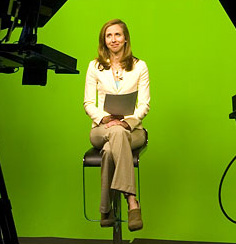Friday Quote II: “The C-Word”

I've long been a fan of Heidi Cullen. I even used to watch Forecast Earth, the sole program on The Weather Channel that focused on climate change, until she was axed. And she was terrific in the great film “Everything’s Cool" which examined the censorship she faced on climate change reporting from her higher-ups. But she can't be silenced. Now, she's at Climate Central -- an independent, non-profit journalism and research organization. She is also a Visiting Lecturer at Princeton University and the author of The Weather of the Future. Check her piece on a very important topic of late - climate change and tornadoes:
My phone tends to ring a lot more when the weather is bad. I often get calls from reporters and producers who usually ask me the same question a bunch of different ways. "Is this global warming?" "Is climate change to blame?" "Is the weather getting worse?"
These are big -- almost existential -- questions. I suspect they are a polite way of asking, "Is this our fault?"
Climate scientists approach the question a little differently. We want to test how global warming shifts the odds of a severe weather event. Just like medical researchers do with cigarette smoking and lung cancer. In fact, this line of climate research comes straight out of epidemiology. In essence, we're doing autopsies on extreme weather events to find out what made them so bad-ass.
Depending on the type of extreme weather event, my answer can be short or long, straightforward or complicated. Keep in mind, all weather is now born into an environment that is warmer and moister because of man-made greenhouse gas pollution. But we don't always know what influences (man-made or natural) will win out on any given day.
Events like droughts, wildfires, heat waves and heavy downpours get my short answer. We know they are going to become more frequent, more intense, and last longer. In fact, we can already see this playing out in historical data. (For a complete overview, check out the "Global Climate Change Impacts in the US", as well as some newly published research summarized here.)
Tornadoes get the long answer. Will they become more frequent, more intense? Will Tornado Alley get bigger? Will the season last longer? Jeff Masters and Andrew Freedman have both done a great job laying out the state of the research.
The bottom line is that two of the key ingredients that go into making a tornado are expected to change as a result of global warming -- water vapor (moisture in the atmosphere) and wind shear (changing wind speed and direction with height). Thanks in part to warmer oceans, water vapor has already increased about 4% and it will continue to increase as the planet warms -- providing more fuel for storms. But wind shear may decrease and that could mean fewer tornadoes. So which influence wins out -- increasing water vapor or decreasing wind shear? We don't know yet.
Read the rest of her post HERE.
